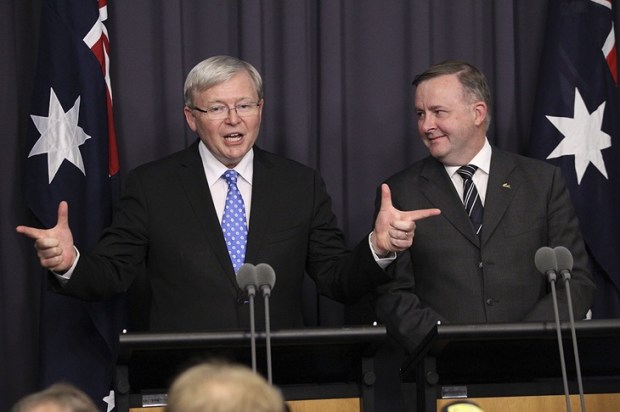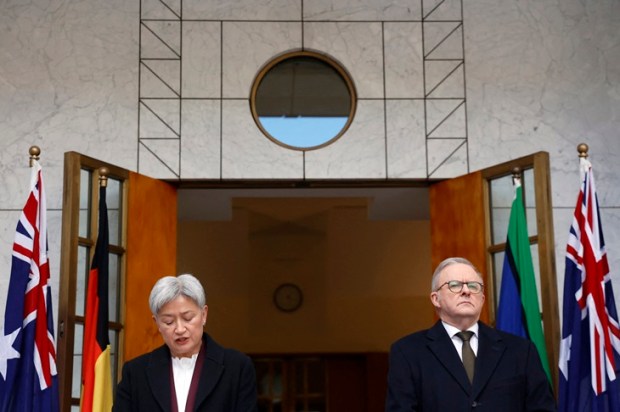Australian Prime Minister Anthony Albanese has realised a long-held ambition. From his early days in politics speaking at pro-Palestine rallies, he has now formally announced that his government will recognise a Palestinian state. For many, this moment signals more than a policy shift – it suggests that violence and extremism are being rewarded.
After the October 7, 2023 massacre of 1,200 Israelis and the abduction of 250 hostages by Hamas, Australians witnessed a chilling reaction just 48 hours later. On the steps of the Sydney Opera House, some demonstrators chanted openly antisemitic slogans – including ‘Gas the Jews’ and ‘F*** the Jews’. No arrests were made. No consequences followed. Instead, these events marked the beginning of increasingly hostile takeovers of public spaces by radical activists, especially in Melbourne and Sydney.
Since that day, the Albanese government – including Foreign Minister Penny Wong – has consistently condemned Israel, calling for ceasefires while hostages remained in captivity, and urging ‘restraint’ even as the bodies of civilians were still being recovered. Meanwhile, protests have included chants like ‘From the river to the sea, Palestine will be free!’ (widely interpreted as a call for the elimination of Israel), ‘Death to the IDF’, and ‘All Zionists are terrorists’. In recent demonstrations, swastikas have appeared, and images of Ayatollah Ali Khamenei have been praised – again, without arrests or consequences.
Western nations such as France, the UK, Canada and now Australia, are now pushing ahead with recognition of a Palestinian state. Yet glaring questions remain: What are the proposed borders? Who will govern? What about the obligations under the Oslo Accords?
The Oslo Accords, signed in the 1990s, laid out a framework for Palestinian statehood that required several critical steps: formal recognition of Israel’s right to exist, a renunciation of terrorism, the development of democratic institutions, and the establishment of civil governance. These were to precede any final-status negotiations on key issues such as borders, refugees, and Jerusalem.
But instead of progressing toward these commitments, the Palestinian leadership has repeatedly rejected peace offers. In 2000, then-Israeli Prime Minister Ehud Barak, with US President Bill Clinton’s mediation, offered Yasser Arafat a deal including 96 per cent of the West Bank and Gaza, plus shared control over East Jerusalem. Arafat walked away and launched the Second Intifada, triggering a wave of suicide bombings and terror attacks.
In 2005, Israel withdrew unilaterally from Gaza, removing every last Israeli civilian. The expectation was that the Palestinians would seize the opportunity for self-governance and development. Instead, Hamas took over, destroyed what infrastructure remained, and turned Gaza into a terror base. Billions in international aid, much of it funnelled through UNRWA, have enriched Hamas leaders and funded the construction of an underground terror tunnel network and the pay-for-slay program whereby families of martyrs receive generous pensions for life.
Despite this record, Western governments are moving forward with recognition of a Palestinian state, before Hamas is dismantled, and before the Palestinian Authority meets even the most basic obligations of the Oslo framework. This not only undermines the accords but also sends a dangerous message: that agreements with the West are negotiable, and terrorism brings results.
What happens if future Palestinian elections bring Hamas to power? Australia, the UK, Canada and France all officially classify Hamas as a terrorist organisation. Recognising a state potentially governed by such an entity defies logic and undermines international law and consistency.
Israel has made its position clear: release the hostages and dismantle Hamas. Instead of supporting the region’s only democracy, Western leaders have repeatedly applied pressure to force Israel into a ceasefire – essentially allowing Hamas to regroup and continue its campaign. Indeed, Hamas leaders now openly declare they will not stop until they take Jerusalem. Let’s be clear: Jerusalem is Israel’s eternal capital, referenced over 600 times in the Bible.
Why should Hamas or the Palestinian Authority ever meet the conditions of peace when they see the rewards for intransigence? Western leaders impose sanctions on Israel, cut defence contracts, and remain silent as Jews are intimidated on their own streets.
To Albanese, Wong, and others: the Jewish people are not weak. Our knees do not tremble. The world stood silent during the Holocaust. Today, you again turn away, not from genocide in Congo, Yemen, Syria, or Nigeria, but from Israel defending itself. You are silent when a hostage like Evyatar David is shown digging his own grave in a Hamas tunnel, yet full of opinions when it comes to Israel’s right to exist and defend itself.
Recognise Palestine all you want. But history suggests it will not lead to peace. Since 1947, every offer of peaceful coexistence has been rejected by Arab leadership. The term ‘Palestinian’ itself was popularised by Arafat with Soviet backing. Jews, too, were once considered Palestinians under British Mandate rule. The real tragedy is that while many Arab nations are moving toward peace with Israel – driven by economic opportunity and strategic interest – the Palestinian leadership remains stuck in the past, with little regional support. Today the Palestinians worship the propaganda that would make Goebbels proud.
As long as they teach hatred more than hope, and martyrdom over motherhood, peace will remain out of reach. As Golda Meir once said: ‘Peace will come when the Arabs will love their children more than they hate us.’
That remains true today.

























